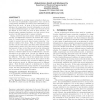Free Online Productivity Tools
i2Speak
i2Symbol
i2OCR
iTex2Img
iWeb2Print
iWeb2Shot
i2Type
iPdf2Split
iPdf2Merge
i2Bopomofo
i2Arabic
i2Style
i2Image
i2PDF
iLatex2Rtf
Sci2ools
165
click to vote
SASN
2006
ACM
2006
ACM
Diversify sensor nodes to improve resilience against node compromise
A great challenge in securing sensor networks is that sensor nodes can be physically compromised. Once a node is compromised, attackers can retrieve secret information (e.g. keys) from the node. In most of the key pre-distribution schemes, the compromise of secret information on one node can have substantial impact on other nodes because secrets are shared by more than one node in those schemes. Although tamper-resistant hardware can help protect those secrets, it is still impractical for sensor networks. Having observed that most sensor network applications and key pre-distribution schemes can tolerate the compromise of a small number of sensors, we propose to use diversity to protect the secret keys in sensor networks. Our scheme consists of two steps. First, we obfuscate the data and the code for each sensor, such that, when attackers have compromised a sensor node, they need to spend a substantial amount of time to find the secrets from the obfuscated code (e.g., by reverse engin...
Related Content
| Added | 14 Jun 2010 |
| Updated | 14 Jun 2010 |
| Type | Conference |
| Year | 2006 |
| Where | SASN |
| Authors | Abdulrahman Alarifi, Wenliang Du |
Comments (0)

